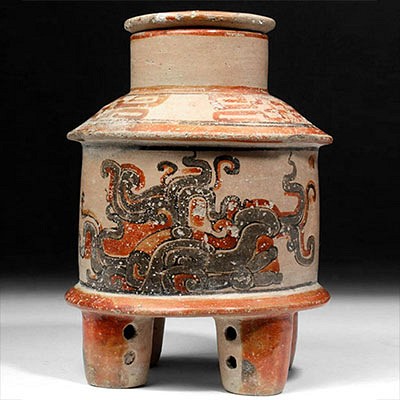Panamanian Veraguas Gold Bell w/ Bird
Lot 242
About Seller
Artemis Gallery
686 S Taylor Ave, Ste 106
Louisville, CO 80027
United States
Selling antiquities, ancient and ethnographic art online since 1993, Artemis Gallery specializes in Classical Antiquities (Egyptian, Greek, Roman, Near Eastern), Asian, Pre-Columbian, African / Tribal / Oceanographic art. Our extensive inventory includes pottery, stone, metal, wood, glass and textil...Read more
Categories
Estimate:
$3,600 - $5,400
Absentee vs Live bid
Two ways to bid:
- Leave a max absentee bid and the platform will bid on your behalf up to your maximum bid during the live auction.
- Bid live during the auction and your bids will be submitted real-time to the auctioneer.
Bid Increments
| Price | Bid Increment |
|---|---|
| $0 | $25 |
| $300 | $50 |
| $1,000 | $100 |
| $2,000 | $250 |
| $5,000 | $500 |
| $10,000 | $1,000 |
| $20,000 | $2,500 |
| $50,000 | $5,000 |
| $100,000 | $10,000 |
| $200,000 | $20,000 |
About Auction
By Artemis Gallery
Jul 22, 2021
Set Reminder
2021-07-22 10:00:00
2021-07-22 10:00:00
America/New_York
Bidsquare
Bidsquare : Summer Antiquities & Ethnographic Art Auction
https://www.bidsquare.com/auctions/artemis-gallery/summer-antiquities-ethnographic-art-auction-7245
Travel around the world and back in time...and be amazed at the treasures you will find! Antiquities from Egypt, Greece, Italy and the Near East, Asian, Pre-Columbian, African / Tribal / Oceanic, Native American, Spanish Colonial, Russian Icons, Fossils, Fine Art, much more! Artemis Gallery info@artemisgallery.com
Travel around the world and back in time...and be amazed at the treasures you will find! Antiquities from Egypt, Greece, Italy and the Near East, Asian, Pre-Columbian, African / Tribal / Oceanic, Native American, Spanish Colonial, Russian Icons, Fossils, Fine Art, much more! Artemis Gallery info@artemisgallery.com
- Lot Description
Pre-Columbian, Panama or Costa Rica, Veraguas (Chiriqui), ca. 500 to 1200 CE. A splendid 83.4% gold (equivalent to 20K) bell pendant with a bird perched atop, presenting a dramatic form with outspread wings. The body is a hollow, rounded shape that contains the clapper ball and a horizontal slit on the bottom for emitting sound. The body tapers inward to a flat top with two ridges surrounding the bird’s clawed feet. The bird stands upright, with wings out, tail projecting back and head facing forward. The beak curves downward and the eyes bulge out to the sides. Under the tail is an integral suspension loop. This beautiful bell would have been sewn onto clothing or woven into jewelry. Imagine the brilliantly colored birds such as macaws and toucans that inhabit the lush rain forests of Costa Rica and Panama. These birds and other loud and vibrant creatures are the inspiration for the goldwork of the region. Cast by the lost-wax (cire perdue) process, Veraguas goldworks range from naturalistic to abstract. Avian motifs are popular since they were prized for their colorful feathers, and birds were considered mystical creatures that could fly beyond this world. The amazing craftsmanship of these master goldsmiths is preserved in this bell which is both of artistic and spiritual importance. Size: 1.36" L x 0.92" W (3.5 cm x 2.3 cm); quality of gold: 83.4% (equivalent to 20K); total weight: 32.4 grams
Gold became the preferred material for creating fashionable ornaments in the Pre-Columbian world sometime after 500 CE replacing jadeite and other green stones from which artists had made impressive jewelry for centuries. Indeed, the ancient cultures of the New World created countless gold ornaments and ceremonial objects. Unfortunately, however, the Spanish conquistadors melted nearly all of these to convert them to gold bars and coins for Spain. Given this, surviving genuine pre-Columbian gold is rare and highly coveted by collectors.
For a similar example please see the Metropolitan Museum of Art accession number: 66.196.6
This piece has been searched against the Art Loss Register database and has been cleared. The Art Loss Register maintains the world’s largest database of stolen art, collectibles, and antiques.
Provenance: ex-private New York, New York, USA collection; ex-private M. R. collection, acquired in Panama in 1969
All items legal to buy/sell under U.S. Statute covering cultural patrimony Code 2600, CHAPTER 14, and are guaranteed to be as described or your money back.
A Certificate of Authenticity will accompany all winning bids.
PLEASE NOTE: Due to recent increases of shipments being seized by Australian & German customs (even for items with pre-UNESCO provenance), we will no longer ship most antiquities and ancient Chinese art to Australia & Germany. For categories of items that are acceptable to ship to Australia, please contact us directly or work with your local customs brokerage firm.
#163655Surface abrasions and nicks and bell body near opening slit. Light mineral deposits on bird. Contains clapper ball and emits a rattling sound. Suspended on modern thread.Condition
- Shipping Info
-
All shipping is handled in-house for your convenience. Your invoice from Artemis Gallery will include shipping calculation instructions. If in doubt, please inquire BEFORE bidding for estimated shipping costs for individual items.
-
- Buyer's Premium



 EUR
EUR CAD
CAD AUD
AUD GBP
GBP MXN
MXN HKD
HKD CNY
CNY MYR
MYR SEK
SEK SGD
SGD CHF
CHF THB
THB













